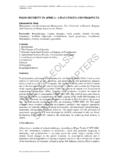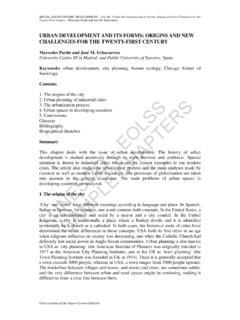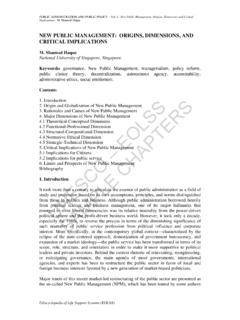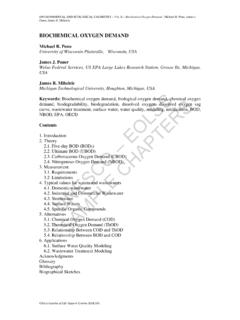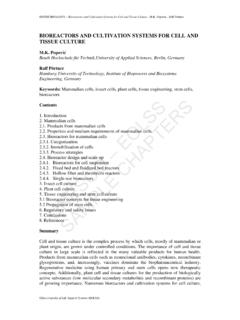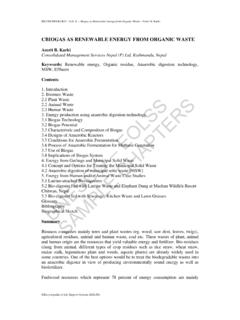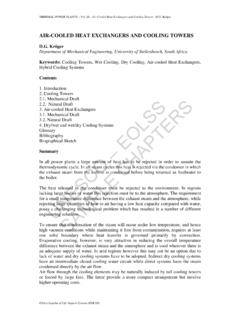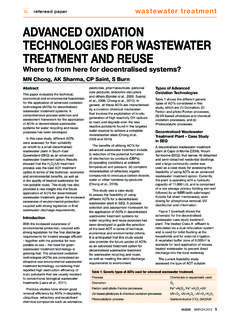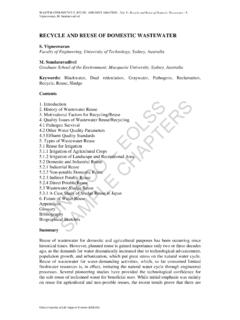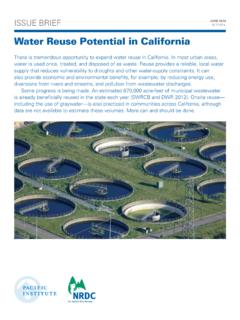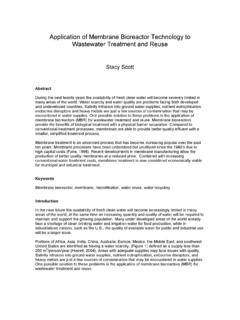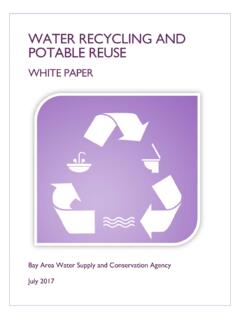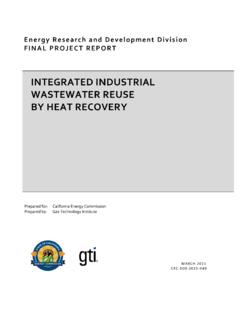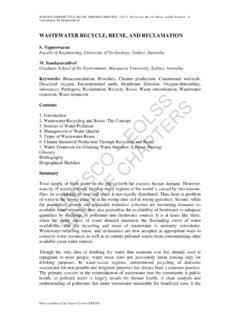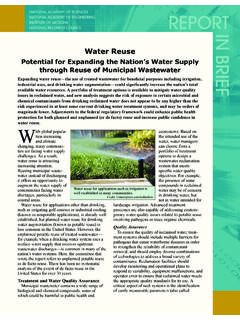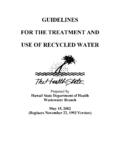Transcription of The Potential for Industrial Wastewater Reuse
1 UNESCO EOLSSSAMPLE CHAPTERSWASTEWATER RECYCLE, Reuse , AND RECLAMATION Vol. I - The Potential for Industrial Wastewater Reuse - C. Visvanathan, Takashi Asano Encyclopedia of Life Support Systems (EOLSS) THE Potential FOR Industrial Wastewater Reuse C. Visvanathan Environmental Engineering Program, Asian Institute of Technology, Pathumthani, Thailand Takashi Asano Department of Civil and Environmental Engineering, University of California at Davis, California, USA Keywords: Agro-industries, Industrial reuses, Institutional aspects, Policy, Waste minimization Contents 1. Introduction 2. Water Availability and Consumption 3. Industrial Wastewater Reuse : Present Status, Trends and Issues Internal Wastewater recycling Reuse of Treated Industrial Wastewater 4.
2 Available Treatment Technologies Pulp and Paper Industries Power Plants Textile Industries Food Processing Industries Other Industries 5. Policy and Institutional Aspects 6. Conclusions Glossary Bibliography Biographical Sketches Summary Continuous extraction of water has resulted in depletion of available water sources in and around the Industrial areas. In addition, Wastewater discharge into natural watercourses has caused surface and groundwater pollution, leaving water unsafe for potable use and impairing Industrial use without major and costly treatment. The current low-cost end-of-pipe treatment approach will become increasingly expensive as effluent discharge standards become more stringent.
3 Meanwhile, technological advancements now make it possible to treat Wastewater for a variety of Industrial reuses. Most industries in even developing countries are already moving towards Wastewater Reuse and source separation, and treatment of separated effluents is gaining more attention. The Wastewater Reuse Potential in different industries depends on waste volume, concentration and characteristics, best available treatment technologies, operation and maintenance costs, availability of raw water, and effluent standards. Radical changes in Industrial Wastewater Reuse have to take into consideration rapidly depleting resources, environmental degradation, public attitude and health risks to workers and consumers.
4 UNESCO EOLSSSAMPLE CHAPTERSWASTEWATER RECYCLE, Reuse , AND RECLAMATION Vol. I - The Potential for Industrial Wastewater Reuse - C. Visvanathan, Takashi Asano Encyclopedia of Life Support Systems (EOLSS) This article discusses the Potential for Industrial Wastewater recycling and Reuse and treatment technologies in attaining such a goal, in an increasingly competitive market and stringent regulatory environment. 1. Introduction Since the Second World War, rapid development has improved the standard of living and quality of life for millions of peoples the world over. This growth has come at the cost of a thirty-fold increase in the use of fossil fuels and a fifty-fold increase in Industrial production over the past century.
5 As a result, significant amounts of once freely available natural resources have been consumed by industry, leaving the earth depleted for future generations. Much of the waste produced from these activities is directly discharged into natural water bodies. In developed countries, industry is the biggest consumer of water and accounts for 50% to 80% of total demand. This is far more than the 10% to 30% in developing countries where agriculture is the largest consumer. However, Industrial water use is certain to increase over the next decade. In many countries, the high rates of consumption in the last decade have exceeded capacity to replenish dwindling water sources and put excessive pressure on existing resources driving up the cost of raw water for Industrial applications.
6 Discharge of Wastewater into natural water bodies is also increasing costs for industries located downstream and this translates into higher production costs which are inevitably passed on to consumers. This discharge is also exceeding natural purification capacities and depleting dissolved oxygen below levels which can support aquatic life. Meanwhile, industries using groundwater have caused severe damage to aquifers and their recharge capacity resulting in lower groundwater levels each year. For countries located in coastal areas, seawater intrusion is also threatening to make groundwater unsuitable for direct use. Public awareness and government application of effluent standards has already forced many industries to implement appropriate treatment technologies.
7 Initially, industries adopted simple physio-chemical treatment systems, but rapid degradation of the environment has forced governments to implement more stringent regulations for Wastewater effluent and these standards have led to more advanced biological and membrane technologies. As water for Industrial applications becomes less easily accessible, industry is looking for ways to recycle and Reuse treated water. Figure 1 shows how raw water for Industrial applications can be supplied by recycling and reusing Industrial and municipal Wastewater . Reusing Wastewater is an attractive economic alternative and helps conserve an essential commodity for future generations.
8 Economic use also reduces the quantity of waste diverted to treatment facilities and further lowers treatment costs. Companies invest in Wastewater treatment and Reuse not just to comply with effluent standards but because product recycling and raw material recovery benefit a company s image as well as the bottom line. In contrast to agriculture, only a small fraction of Industrial water is actually consumed. Most is discharged as Wastewater . UNESCO EOLSSSAMPLE CHAPTERSWASTEWATER RECYCLE, Reuse , AND RECLAMATION Vol. I - The Potential for Industrial Wastewater Reuse - C. Visvanathan, Takashi Asano Encyclopedia of Life Support Systems (EOLSS) Figure 1. Wastewater recycling and Reuse domain Industrial Wastewater treatment has taken place in a series of development phases (Figure 2) starting from direct discharge to recycling and Reuse .
9 This development has been slow considering the growing awareness of environmental degradation, public pressure, implementation of increasingly stringent standards, and Industrial interest in waste recycling . The declining supply and higher cost of raw water is also forcing industry to implement recycling technologies. Many industries are now concentrating on methods to abate potable water intake and reduce discharge of polluted effluent. The move toward Wastewater Reuse is reflected in different cleaner production approaches such as internal Wastewater recycling , Reuse of treated Industrial or municipal Wastewater , and Reuse of treated Wastewater for other activities.
10 Figure 2. Development of Industrial Wastewater treatment and Reuse UNESCO EOLSSSAMPLE CHAPTERSWASTEWATER RECYCLE, Reuse , AND RECLAMATION Vol. I - The Potential for Industrial Wastewater Reuse - C. Visvanathan, Takashi Asano Encyclopedia of Life Support Systems (EOLSS) The Potential for Industrial Wastewater Reuse is dependent on a variety of factors and differs from one industry to another. Industries consuming a large volume of water obviously have greater Potential for internal Reuse . Similarly, simple physical and chemical treatments may be sufficient for Wastewater produced from activities such as washing floors and cooling.
